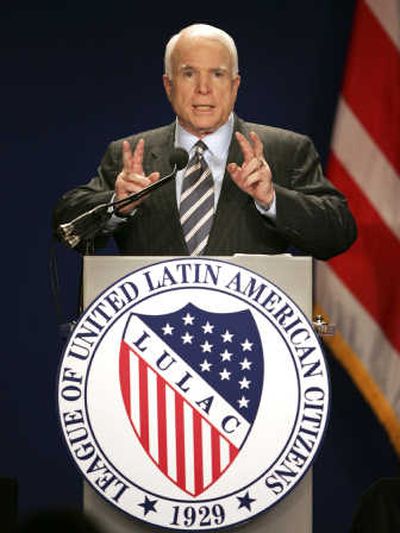McCain reaches out to Hispanic voters

WASHINGTON – John McCain, angling to win a bigger share of the fast-growing Hispanic voter bloc, is taking the risky step of placing an immigration overhaul at the center of his appeal.
The presumed Republican presidential nominee, who trails Barack Obama among Hispanics, had been focused on assuring conservatives that he would secure the U.S. border with Mexico. But McCain now has settled on a message that places equal weight on a promise to help employers, immigrant workers and their families. That suggests that as president he would back the kind of legislation, most notably a legalization plan for undocumented workers, that has roiled so many members of his own party.
McCain’s approach was on display Tuesday when, appearing here before a major Hispanic group, he pledged to deal “practically and humanely with those who came here, as my distant ancestors did, to build a better, safer life for their families.”
And in a new series of advertisements – produced in Spanish and English – and a five-minute video, McCain talks about his long ties to the Hispanic community and says the needs of immigrants are “as important” as helping businesses and securing the border.
“We will solve it with legislation that’s practical and fair,” McCain says of immigration in the video, according to a script obtained by the Los Angeles Times. “We will abide by the law in every way. We will secure our borders first and ask border-state governors to certify that the border is secure.
“Then, we will address the burden U.S. employers are enduring by creating a temporary-worker program, so employers can hire and people can have jobs. And as important, we will be sensitive to the immigrant workers and their families who are doing the work that must be done.
“We are all God’s children. Fairness to all is the key to success,” he adds.
McCain steers clear of directly calling for a pathway to U.S. citizenship for illegal immigrants. But his subtle language matches that of legalization advocates.
The video, filmed during a recent campaign swing through New Mexico, may be shown publicly for the first time next week, when McCain is scheduled to address another large Hispanic group, the National Council of La Raza, which is meeting in San Diego.
His move to highlight the needs of immigrants underscores the importance of Hispanic voters – particularly in the key battleground states of Nevada, New Mexico, Colorado and Florida – and suggests that whoever wins the presidency will be committed to giving some kind of legal status to many of the estimated 12 million illegal immigrants now in the United States.
Obama, the presumed Democratic nominee, has promised to support an immigration overhaul that would include a legalization plan in addition to enhanced border security measures.
On Tuesday, Obama, who also addressed the League of United Latin American Citizens, accused McCain of abandoning his support for giving illegal immigrants a path to citizenship.
He noted that during the GOP primary season, McCain had said he would not vote for the legalization plan that he once championed because “people want the border secured first.” Obama suggested Hispanic voters should not trust McCain as a loyal friend.
“Senator McCain used to buck his party on immigration,” Obama said. “Well, for eight long years, we’ve had a president who’s made all kinds of promises to Latinos on the campaign trail, but failed to live up to them in the White House, and we can’t afford that anymore. We need a president who isn’t going to walk away from something as important as comprehensive reform when it becomes politically unpopular.”
Obama signaled that a key component of his Hispanic outreach will be drawing personal links between his life and the immigrant story. He likened the desires of new immigrants to those of his own father, who came to the U.S. from Kenya.